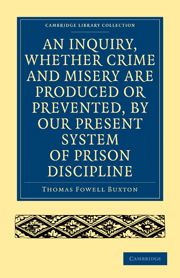Summary
Having thus described two distinct and opposite modes of prison discipline, I would suggest to my reader, that a comparison of these is the most certain criterion of their respective merits.
That vice and misery are produced by the one, and prevented by the other, may be gathered from the following facts:–
On the 14th December, 1817, an account was taken at my request of the number of prisoners in the second station in Newgate, who had been there before. It appeared that out of two hundred and three, forty-seven of those convicted, besides seven of those acquitted, had within the two preceding years, been confined there. It is probable that many (passing under fictitious names, and anxious to appear as offenders for the first time, which might operate in mitigation of their sentence), were not recognized. Newgate, it is to be remembered, is but one prison among several; many who had never been there before, were known to have been in the other jails of the metropolis and county. Amongst the boys, of the ten first I examined, five confessed that they had previously been convicted of other crimes. Taking these circumstances into consideration, we may fairly presume that forty per cent, of those discharged from prison return there again, and this calculation is considerably lower than that made by all the jailers of London and its vicinity, whom I have consulted.
In the jails at Bury, Philadelphia, and Ghent, five per cent. is the average return.
- Type
- Chapter
- Information
- An Inquiry, whether Crime and Misery are Produced or Prevented, by our Present System of Prison Discipline , pp. 137 - 141Publisher: Cambridge University PressPrint publication year: 2009First published in: 1818



